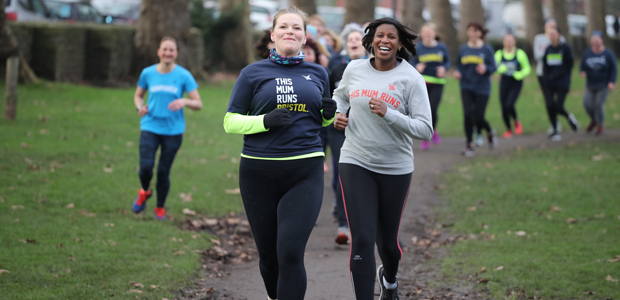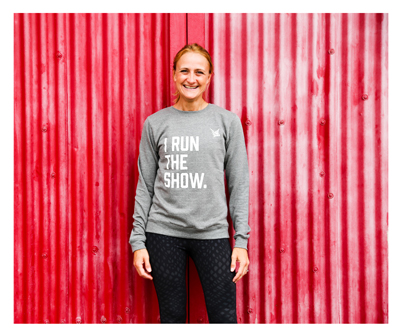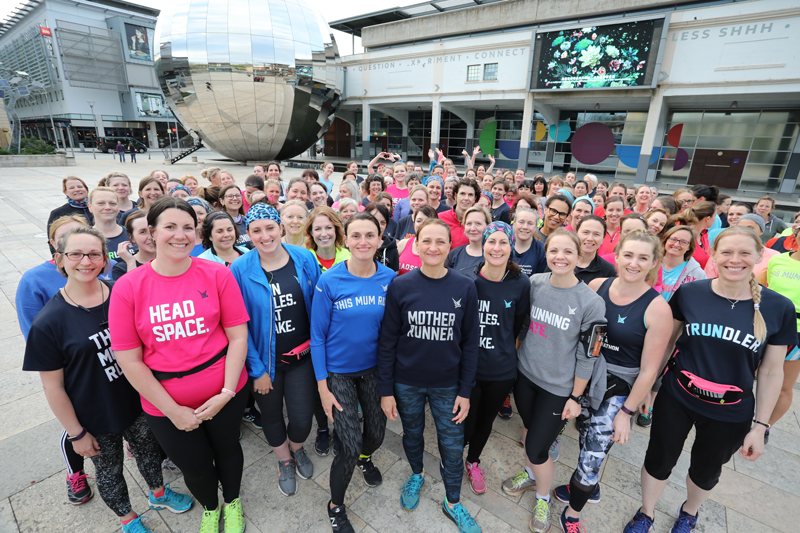
Meet Mel - Founder of This Mum Runs
This Mum Runs is the largest mobile, on and offline running community for Mums in the world, aiming to empower millions of women to feel great about themselves just through moving more and doing it using the power of community. Here we chat to Mel Bound, Founder and CEO of This Mum Runs, as part of our International Women's Day celebrations.
Tell me a little bit about yourself and your background?
I’m the CEO and Founder of This Mum Runs. A Sports Science graduate, I have always been especially interested in women and health, and understanding the psychology behind sport and physical activity, what makes some people want to move more, and what makes others feel they can’t. After graduating I worked for a national fitness chain, but became disillusioned with the conveyor belt mentality of gyms in the 90s - selling memberships, with no real interest in people achieving their goals. I moved to work in Sports Marketing, heading up the event team delivering televised athletics events and became really passionate about creating live experiences for people to enjoy sport. More recently I headed up the Strategy team for a global experiential agency, focussed on creating brand experiences that changed how people felt or acted. All of these experiences are reflected in my approach to creating and building This Mum Runs over the past 5 years.

Tell me a little bit about This Mum Runs and what you do?
This Mum Runs is the largest mobile, on and offline running community for Mums in the world, recently recognised by Facebook as one of the Top 16 Most Impactful Communities in the World. We’re on a mission to empower millions of women to feel great about themselves just through moving more and we do it using the power of community plus a unique pressure free ethos that focuses on minutes moving, rather than distance or pace. In 2020 we launched our first App, Run30, the first running App by women for women, aiming to support women who have never run before to run for 30 minutes. We also have a growing network of local Facebook communities, which supports a programme of free weekly runs. And our revenue comes from an ecommerce store, selling a range of leggings, tees and sweatshirts that we have shipped to 22 countries around the world.
Where did the idea come from?
When my daughter was 18 months old I had a fall out running and injured my back, leading to major surgery and months of rehab. I was struggling to adjust to life as a new Mum, and without running which was so central to my identity, I became completely inactive. I wondered if I was finding it hard as someone who had always been active, how were Mums who never had been active coping with making time to look after themselves? A post on Facebook led to 75 Mums turning up to meet me for a run - I can still remember the euphoria of that first run and it was only 5 or 10 minutes down the road. It was that classic lightbulb moment when I realised “oh wow, there are a lot of us feeling like this!”. It wasn’t even about the running, it was about that moment of connection with women who feel just like you - I knew I had stumbled onto something really meaningful and This Mum Runs was born.
What is the goal and vision?
Our vision is to create a world where all women enjoy the life changing benefits of being active. We’re very focussed on curating digital and IRL experiences that slowly peel away all of the barriers women face when it comes to being active - changing the way women feel about themselves, their bodies and what they are capable of has the potential to change millions of women’s lives. With 1 in 3 women globally doing so little exercise it shortens their life, this is pretty meaningful work for us. With the digital tools we now have - our App and our playbook for community growth, we are on a mission to make our programmes and products available to Mums in every corner of the globe.
What challenges face you being a female founder?
Women are seriously underrepresented in entrepreneurship and yet £250 billion could be added to the UK economy if women started and scaled businesses at the same rate as men. Appetite to start a business is not the issue (as more women than men aspire to start their own business), but there are many challenges that women uniquely face when starting a business.
For me the biggest challenges for women are twofold - confidence in ourselves (the dreaded imposter syndrome) and not being taken seriously by funders and investors. As a female founder seeking funding or investment, we are twice as likely to be treated negatively. Whereas would be investors of male businesses focus on reward, questions to female leaders focus more on risk. This has been my experience too.
So much of building confidence has to do with being able to see other women “like us” out there doing it. Networks such as Facebook’s She Means Business are really important as they shine a light on women doing inspiring things, as well as providing opportunities for networking and training. It helps women to own their success, to believe in themselves and have the confidence to keep going.
What challenges do you face trying to be a female founder and raising a family?
I started my business when my son was a year old and my daughter had just started school. In the early days I was part of a business accelerator that was very intense, and it was hard to switch off and focus on the kids in the evenings and at weekends. I remember feeling a lot of guilt that they were at after school clubs most days. Going through two funding rounds as well was a very difficult juggle with work and home - one that the majority of male founders would not have to deal with. I remember the night before a big investment pitch a couple of years ago, staying up late to make my daughter's Owl Birthday cake that she had pleaded for, instead of practising my pitch - how could I not? Luckily we secured the money AND she was happy, but I was pretty exhausted!
The past 12 months have been especially challenging. The COVID pandemic has meant that my children have been at home for much of the last year. They’re still too young to be left to their own devices, and my husband’s employer was not terribly flexible at first. So I would homeschool them until 3 every day then start work and work until I dropped late in the evening. Working at home has meant it is much more challenging to create boundaries between work and family time too and my children constantly nag me “Mummy, get off your phone!”
I try to involve the kids in the business as much as I can - test ideas on them, ask for suggestions for new designs and talk to them about some of the things I am finding hard. It’s helping them to learn so many important lessons about making mistakes, perseverance, innovation and not always knowing all the answers that I hope will stand them in good stead!
What advice would you have for other women in a similar position to you?
I always try to be as honest and vulnerable as I can when I am sharing my experience of building a business and running a family. We can’t be what we can’t see, and when I started out I couldn’t find anyone who was that relatable to me and my life starting a business. Someone told me once, “It feels hard, because it is hard” and I remember thinking “ohhhhh!”, it took so much pressure off feeling like I was failing at everything. So be generous with what you share, you never know who you might be inspiring.
The other important thing is to always try and carve out some time that is just for you. When we try to do everything for the business and for the family, but don’t take care of ourselves everything falls over. Prioritise the time - even half an hour a couple of times a week - to do something that you love. It might be a walk, reading a book, a run, calling a friend - something small that helps to reset your body and mind is a real gamechanger.
How has COVID impacted you and This Mum Runs?
The past 12 months have been a mix of the most challenging of times personally and yet also a year of the most incredible growth. We temporarily closed our runs and the store at the start of the first lockdown to keep everyone safe, and I was shielding.
But it gave me an opportunity to really focus on what mattered most - the things we needed to do to ensure women in our community stayed active, felt connected and mentally well. This involved pivoting all of our programmes online, launching our first App that aimed to keep women moving with the support of a global community, and a new Virtual Challenge Series which has been incredibly successful - with 68% of women in the TMR community more active than before CoVid. I also closed our warehouse and we took the decision to shift operations to an outsourced fulfilment partner supported by a print on demand partner which gave us business continuity and massively reduced our stock holding liabilities. And we secured three fantastic new partnerships which enabled us to invest in growing the team.

One of the things I am most proud of though is that even while we were closed and unable to ship products, our customers kept shopping anyway! This is the sign of true, money can’t buy loyalty that comes from a community first business.
If you could go back would you do anything differently?
The journey so far has been one massive learning curve, and it’s difficult to say I would do anything differently because you do the best you can with what you know at the time.
However, the one thing I’ve learned above all else is that less is more. Focus on fewer things and do them better, say no more and the growth will come. And your team will thank you for it!
What do you have planned for the future?
With CoVid restrictions starting to be relaxed, we are focussed behind the scenes on preparing to re-open local runs across our 70+ communities at some point in early summer. This is also a year of ambitious growth with our playbook for community rollout and getting the TMR App into the hands of as many women as we can. And we are working on launching our own apparel designs - starting with a range of “by women, for women” leggings in the spring. With women’s activity levels at an all time low, our work is needed now more than ever before.

